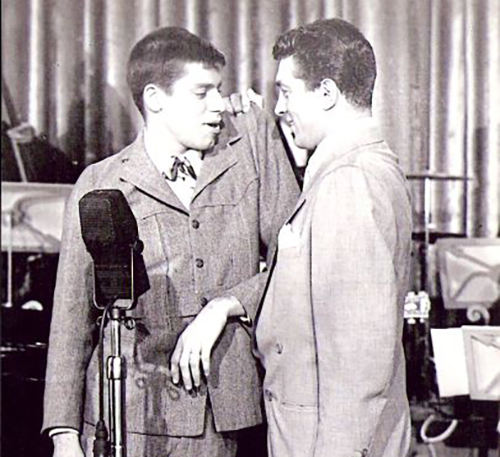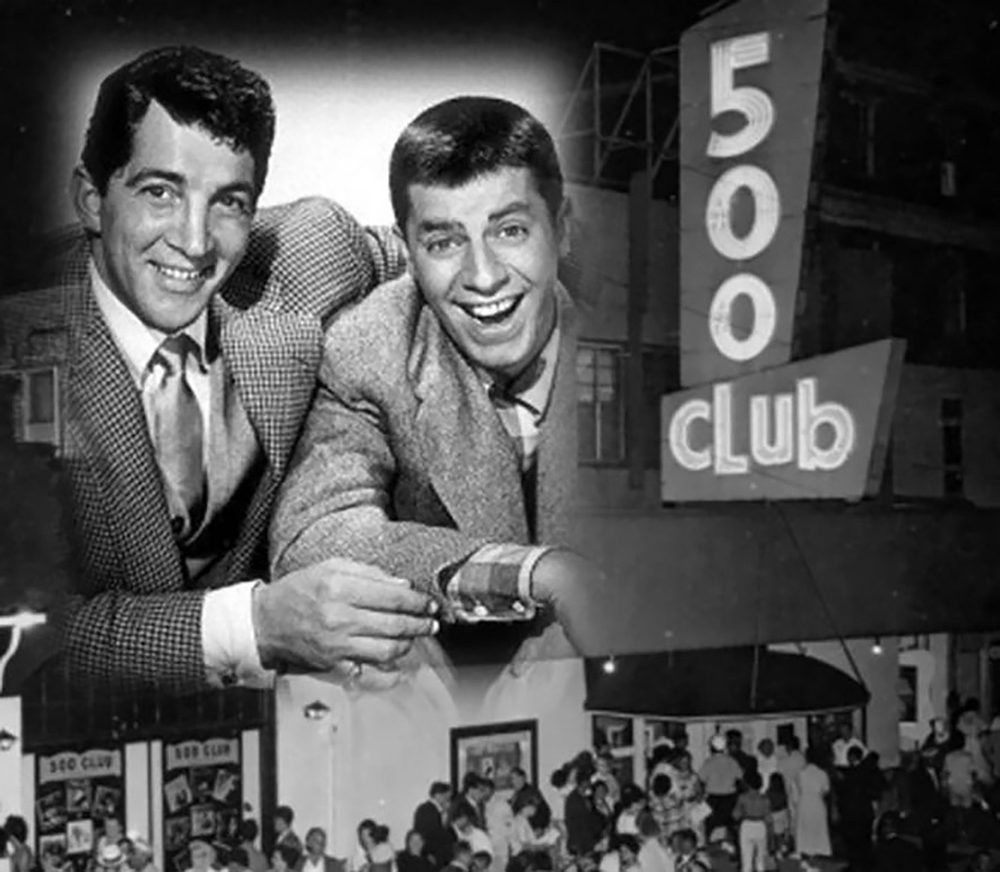By Bruce Klauber
The story of how Dean Martin and Jerry Lewis first teamed up has been told and retold with many variations, mostly by Jerry Lewis. What we are certain of is that their debut as a comedy team took place at Atlantic City’s 500 Club, at 6 Missouri Ave., on Thursday night, July 25, 1946; and that within a short time, the duo became the hottest act in show business and remained so until their breakup 10 years to the day later.
In 1946, the 500 Club was on its way to becoming a nationally known entertainment venue that booked the biggest stars in the business, from Frank Sinatra and Sammy Davis, Jr. to Nat “King” Cole and Dean Martin. In June of 1946, the colorful and iconic Atlantic City legend, Paul “Skinny” D’Amato, and a partner named Irwin Wolf, bought out one-half of the interest in the club from owner Marco DiFozio. The beloved D’Amato, whose connection to organized crime has been well-documented, became the sole owner three years later.
The club was open from 5 p.m. until 10 a.m., with the last show taking place at 4 a.m. There was gambling in the rear, until the police shut it down in the early 1950s. By 1955, the capacity of the venue was said to be 700, but in 1946, the 500 Club was relatively small, seating somewhere between 300 and 400. The entertainment in those early days consisted of regional acts as well as mid-level performers from the East and West coasts.
It’s important to note that at that time, dozens – perhaps hundreds – of nightclubs, restaurants, cafes and bars in bigger cities all over the country regularly booked singers, comics, dancers, variety performers and musicians. Work was plentiful for a good performer, though most of them never ended up playing the Copacabana in New York City, the Holy Grail of nightclubs at the time. Good work, though not yet great work, was plentiful for Dean Martin.
Martin, a good-looking crooner who had an easy way with a song and was always well-liked by audiences, especially female, was experiencing a modicum of success in mid-line New York clubs like the Riobamba and the Havana-Madrid. He also had a 15-minute radio show broadcast locally in New York City and signed a recording contract with the miniscule Diamond Records. No, it wasn’t big-time stuff yet, but it was clear that Martin was on his way to better things. The same could not be said of Jerry Lewis during that period.
Since his teens, Lewis had been knocking around with what was called a “record act,” humorously miming to recordings, something that would be a part of his nightclub show for years. By all accounts, it was corny and anything but successful. He bombed in burlesque, proved to be an ill-at-ease master of ceremonies, and worked all kinds of day jobs until he finally landed a booking at Brown’s in the Catskill Mountains. For whatever reason, the audiences there reportedly loved his craziness and the hokey record act. His bookings did improve slightly after that, but not by much.
 Performers on the nightclub circuit around New York City back then often met and hung out, often bemoaning the state of their careers, and Martin and Lewis met several times, quite casually, around 1945. In that year, the two found themselves on the same bill at a New York City nightspot called The Glass Hat.
Performers on the nightclub circuit around New York City back then often met and hung out, often bemoaning the state of their careers, and Martin and Lewis met several times, quite casually, around 1945. In that year, the two found themselves on the same bill at a New York City nightspot called The Glass Hat.
According to a couple of New York City gossip columns, Lewis “fooled around” during Martin’s act, interrupting Martin’s singing with bad jokes and general mayhem. The columns reported that Glass Hat audiences got a real kick out of it. Though Lewis claimed years later that they were “just screwing around,” what the team did on stage in the club that night was the genesis of the act they would perform for the next 10 years.
As individual solo acts in 1945, Martin and Lewis joined other barely known performers on The Glass Hat schedule that year, including, said a newspaper ad, a “new singing star with a new singing style” named Mary Jane Walsh, Sonny Kendis and his Orchestra, Jose Manzanares and his South Americans, and radio’s Frank Bessinger. It was hardly earth-shaking entertainment.
Lewis’ tireless manager, Irving Kaye, believed his client was headed for stardom and could do no wrong, despite Lewis’ bombing virtually everywhere. Kaye convinced Lewis’ booking agent, Abby Greshler, to book Lewis and his record act into Atlantic City’s 500 Club for $150 per week. In all probability, Lewis was booked at the 500 for Tuesday through Saturday – and perhaps for a Sunday matinee – July 23 through July 27, 1946. In line with the actual formation of the comedy team, Lewis’ repeated story over the years was that the singer booked to be on the bill at the 500 Club that week somehow became unavailable, and that he suggested to Skinny D’Amato that Dean Martin would be perfect to take over the spot.
According to Lewis’ biographer Shaun Levy, as well as authors Arthur Marx and Jonathan Van Meter, and all wrote extensively about Martin and Lewis, that is not what happened. The truth, said the authors, is that Lewis and his record act laid an egg again, and Skinny D’Amato was furious. On top of that, D’Amato’s partner, Irvin Wolf, just couldn’t stand Jerry and his act, and refused to be in the club when Lewis took the stage.
The 19-year-old Lewis, who already had a wife and child to support, really needed that job and begged D’Amato to keep him on. He promised D’Amato that he would do “some funny stuff” with Dean Martin, already on his way to the shore. Just who made calls to what agent to get Martin down to Atlantic City remains a question, but the fact is, D’Amato relented, and Martin was brought in. It helped that D’Amato wasn’t all that happy with singer Jack Randall, second on the bill next to headliner Jayne Manners and third-billed Jerry. Note that veteran nightclub performer Sophie Tucker, “The Last of the Red Hot Mamas,” was headlining in the club’s back room during that week in July.
The first show on the night of July 25 did not go well. While Dean was okay, Jerry was on his way to bombing again, further infuriating D’Amato, who told the two that they had best start with “the funny stuff,” or else Dean Martin and Jerry Lewis would be history.
Despite Lewis’ repeated claim that he “wrote the act on a paper bag” between shows, the performance was an expanded, impromptu version of the “fooling around” they did at The Glass Hat: While Martin was on stage and singing in his usual, casually romantic manner, Lewis, dressed as a busboy, began running around the room manically breaking dishes, and generally playing the wild man. He ended up on the stage, continuously interrupting his partner’s singing with jokes, nonsensical patter and all kinds of crazy physical business, all delivered in Jerry Lewis’ patented whine that automatically made you think of him hysterically braying, “Laaaaydeee!”
Lewis often claimed that the two improvised on stage for hours. It was probably closer to 75 minutes, but whatever it was, Martin and Lewis were a hit. A very big hit. Sophie Tucker, according to author Van Meter, called Skinny D’Amato over to her table and said, “Skinny, do yourself a favor, keep these guys and let them do what they’re doing tonight.”
To this day, the meeting and the debut of Dean Martin and Jerry Lewis is how a comedy team defines the term, “overnight success.” Word spread quickly in Atlantic City in those days, and large crowds began coming the following night, a Friday. In several days, the lines were around the block. Headliner Jayne Manners was let go and replaced on the bill by Martin. Jerry was second-billed as an “extra added attraction.” The act helped put the 500 Club on the map and, said Van Meter, “turned Skinny D’Amato into one of the most important nightclub owners in the country.”
In those days, Lewis looked upon his partner as his protector, the brother he never had, and the good-looking ladies’ man he would never be. He also realized Martin’s importance to the team and acknowledged, years later, that Dean Martin was, in all likelihood, the greatest straight man in the history of show business. In the 10 years since they first met, the pair appeared on radio, were regulars on television’s “Colgate Comedy Hour,” starred in 16 motion pictures and appeared in every major nightclub in the country. They were the hottest act and the highest paid attraction in the industry.
By 1956, their partnership had soured. Advisers to each man were trying to convince each of them that they could do better without a partner, and Martin had become increasingly frustrated with the attention Lewis was receiving as well as where his partner’s concept of comedy was headed. He was fed up with Lewis’ belief that he was the next coming of Charlie Chaplin, and that he could do everything from writing and producing to singing and running the cameras. Ten years to the day, the team of Dean Martin and Jerry Lewis was no more. In his later years, Jerry Lewis acknowledged that the breakup was his fault.
The 500 Club would continue successfully until the 1960s, when the club began to have financial problems. The IRS closed it down for several months in 1971 because of back taxes due, and in 1973, the 500 Club was demolished in a fire. The building was not insured and the club was never rebuilt.
Atlantic City, and Martin and Lewis, would not forget Skinny D’Amato. In the summer of 1981, a testimonial dinner honoring D’Amato as the Hebrew Academy of Atlantic City’s Man of the Year was held at Atlantic City’s International Hotel, formerly Teplitzky’s and now the Tropicana’s Chelsea Tower. D’Amato was the first gentile to be honored by the Hebrew Academy in its history.
Appearing in-person were Frank Sinatra and Jerry Lewis, among others. Video clips of Danny Thomas, Sammy Davis, Jr., and Dean Martin were shown. All spoke of how important D’Amato was to them professionally and personally. Dean, doing his drunk act, simply said, “Skinny, you’re the greatest dago that ever lived.” Lewis could only say how he was “befriended, protected, guided, and helped” by Skinny D’Amato.
Paul “Skinny” D’Amato died on June 5, 1984. Dean Martin died on Christmas Day, 1995. Five years earlier, Jerry Lewis walked out on the stage of Bally’s in Las Vegas while Dean Martin was performing. It was Dean Martin’s 72nd birthday and his ex-partner wanted to surprise him. On stage, Lewis said, “Why we broke up, I’ll never know.” Dean replied, “You surprised me. I love you.” Jerry Lewis died on Aug. 20, 2017.
Bruce Klauber is the author of four books, an award-winning music journalist, concert and record producer and publicist, producer of the Warner Brothers and Hudson Music “Jazz Legends” film series, and performs both as a drummer and vocalist.










